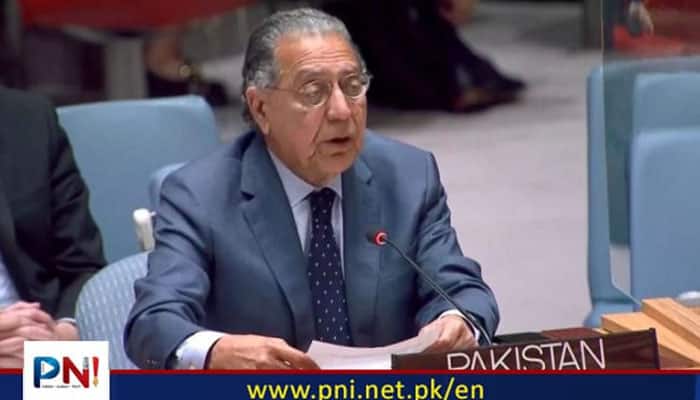UNITED NATIONS, Jun 22 (APP): A top Pakistani diplomat has told the UN Security Council that, despite promises, the Taliban government has not acted “decisively” to halt the cross-border terrorist attacks by the Tehrik-e-Taliban Pakistan (TTP) that have resulted in hundreds of civilian and military casualties.
“The highest priority – for the international community, for Afghanistan’s neighbours and for Afghanistan itself – remains the elimination of terrorism within and from Afghanistan,” Ambassador Munir Akram, the permanent representative of Pakistan to the UN, said in a debate on the situation in Afghanistan.
Pakistan, he said, has repeatedly conveyed to the Taliban — at very senior levels — to act decisively to end TTP’s attacks, disarm its fighters, capture and hand over the terrorist group’s fighters to Pakistan.
“Unfortunately, despite promises, no meaningful action has been taken so far. TTP safe havens remain close to Pakistan’s borders. Cross-border attacks have continued, including one by a TTP associate that killed several Chinese engineers working on the Dasu hydro power project,” the Pakistani envoy told the 15-member Council.
“The impunity which some of these terrorist groups seem to enjoy within Afghanistan poses a dire and direct threat to all of Afghanistan’s neighbours as well as to the international community.”
Ambassador Akram, therefore, urged the Security Council to call on the Taliban government to sever its links with the TTP and its associates; prevent them from carrying out cross-border attacks against Pakistan; disarm the TTP terrorists and and capture the TTP’s leadership and hand them over to Pakistan.
At the outset, he said Pakistan has consistently advocated for sustained engagement with the Afghan interim authorities to normalize the situation in that country.
While welcoming the Taliban’s announced decision to participate in the upcoming UN-sponsored meeting in Doha, Ambassador Akram underlined the need for both the international community and the Afghan interim Government to “be clear about the overall objectives they seek”.
“Unless we know where we are going, we will never get there,” he added.
For its part, the Pakistani envoy said the international community is obliged to help the 23 million Afghans who need urgent aid and to take adequate measures to bolster Afghanistan’s economy — including reviving the national banking system and restoring commercial activity.
The Taliban must also take steps to abide by its international obligations, he said, noting that “the world remains concerned” about restrictions imposed on women and girls in Afghanistan. “These do not conform with international law or the tenets of Islam”, he said, adding, “The AIG (Afghan Interim Government) is expected to ensure the rights of women and girls to education, work and other human rights.”
Pakistan, Ambassador Akram said, enjoys close bonds of ethnicity, history, faith, language and culture with Afghanistan.
“Pakistan has a national compulsion to promote peace, stability and development in Afghanistan. And we will continue to work at all levels – bilateral, regional and international and with the UN– to achieve these objectives.”
Opening the debate, Roza Otunbayeva, Special Representative of the Secretary-General and Head of the United Nations Assistance Mission in Afghanistan (UNAMA), noted that the upcoming meeting in Doha, the third one in this format, is scheduled to take place in nine days and the Taliban have stated that they are preparing to attend.
“We hope that in Doha, key stakeholders will convene around the table, speak to each other face to face, reinforce the principles underlining the consensus to engage, and agree on next steps to alleviate the uncertainties that face the Afghan people”. But, she warned, Doha “has generated significant expectations that cannot realistically be met in a single meeting”.
While there is no substitute for engagement with Afghanistan, “it cannot be repeated enough that this sort of engagement is not legitimization or normalization”, Ms Otunbayeva added.
While the Taliban have maintained political stability, they continue to place severe restrictions on women, and there is little space for internal dissent.
Stressing the need for internal political legitimacy, she added that although more than $7 billion have been provided for humanitarian assistance, “Afghanistan remains beset by massive poverty.”
Follow the PNI Facebook page for the latest news and updates.









